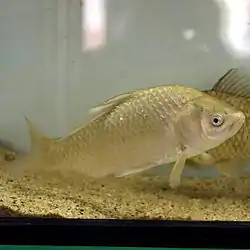源五郎鮒
Japanese
| Kanji in this term | |||
|---|---|---|---|
| 源 | 五 | 郎 | 鮒 |
| げん Grade: 6 |
ご Grade: 1 |
ろう Grade: S |
ふな > ぶな Hyōgaiji |
| jūbakoyomi | |||

ゲンゴロウブナ
Etymology
Compound of 源五郎 (Gengorō, “male given name”) + 鮒 (funa, “crucian carp”). The funa changes to buna due to rendaku (連濁).
According to one theory, the Gengorō portion was the name of a fisherman who fished in Lake Biwa, and every morning, presented the best of his catch of funa to the local lord. In another theory, this term arose from a tale about a Lake Biwa fisherman named Gengorō, who fell in love with a noblewoman and arranged a secret meeting with her by hiding a note inside a gengorōbuna fish that he had caught and presented to her.
Like many biology terms, this word is often spelled in katakana, as ゲンゴロウブナ.
Pronunciation
Noun
源五郎鮒 (hiragana げんごろうぶな, katakana ゲンゴロウブナ, rōmaji gengorōbuna, historical hiragana げんごらうぶな)
- Carassius cuvieri the Japanese crucian carp or white crucian carp, a type of 鮒 (funa, “crucian carp”), an edible freshwater ray-finned fish related to carp and goldfish and endemic to Lake Biwa in Japan
Further reading


This article is issued from Wiktionary. The text is licensed under Creative Commons - Attribution - Sharealike. Additional terms may apply for the media files.